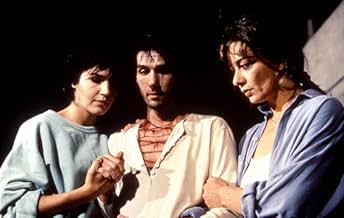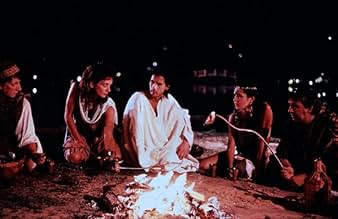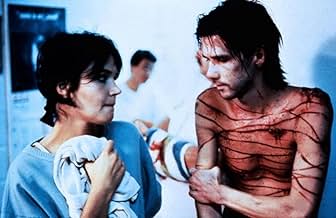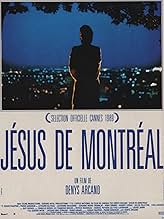VALUTAZIONE IMDb
7,5/10
7763
LA TUA VALUTAZIONE
Aggiungi una trama nella tua linguaA group of actors put on an unorthodox, but acclaimed Passion Play which incites the opposition of the Catholic Church while the actors' lives themselves begin to mirror the Passion itself.A group of actors put on an unorthodox, but acclaimed Passion Play which incites the opposition of the Catholic Church while the actors' lives themselves begin to mirror the Passion itself.A group of actors put on an unorthodox, but acclaimed Passion Play which incites the opposition of the Catholic Church while the actors' lives themselves begin to mirror the Passion itself.
- Regia
- Sceneggiatura
- Star
- Candidato a 1 Oscar
- 18 vittorie e 12 candidature totali
Recensioni in evidenza
Acting doesn't pay much these days, and a team of very good, yet impoverished actors has to work for the church in a show re-creating the life of Jesus. The need for really creating something lingers and frustrates them ; until an old friend comes back from a long trip. This man has talent and charisma enough to shape the others' fuzzy desires into writing a play. They turn their dull show about Jesus into something terrifyingly beautiful that has the public crying. But then, something happens...
This movie is really beautiful and moving, go rent it !
This movie is really beautiful and moving, go rent it !
All of us knows who Jesus is, right?
This movie brings to light a concept of Jesus that most people do not know is a topic of serious academic scholarship. The question is, "What can we reasonably say about Jesus based solely on historical sources?" Of course, the Bible is the primary source, since Jesus is referred to only in passing by nonreligious sources of his time. And, because this is an historical pursuit, one goal is also to separate those things which are clearly matters of faith from those which do not require a religious faith in the man. Therefore, we are left with a Jesus who led an iconoclastic life and was killed for it. The historian cannot say in an historical journal that Jesus was divine, walked on water, or was raised from the dead. This portrait is called "The Historical Jesus".
The historian can, however, make a personal statement of faith-- "I believe Jesus is the Anointed of God, who saves us from our sins". This is not the statement made by "Jesus of Montreal". Masterfully, the cast and crew of the film weave a tale which demands several viewings to fully consume. Both explicitly and through the use of metaphor, Jesus is depicted as a revolutionary teacher of great charisma and whose life was one of tragedy. But this film is not about the traditional Christian concept of Jesus; rather, it illustrates only the human aspects of the man who is, to me, God incarnate. This is the story of Jesus, the man-- not Jesus, the Christ. Christians may be disappointed by it, or outraged, but I encourage us all to remember that where that where faith (trust in that which cannot be observed) begins, there the historian (or scientist) must stop. Believers go further. I highly recommend this movie to anyone who wants to think, be they a believer or not.
This movie brings to light a concept of Jesus that most people do not know is a topic of serious academic scholarship. The question is, "What can we reasonably say about Jesus based solely on historical sources?" Of course, the Bible is the primary source, since Jesus is referred to only in passing by nonreligious sources of his time. And, because this is an historical pursuit, one goal is also to separate those things which are clearly matters of faith from those which do not require a religious faith in the man. Therefore, we are left with a Jesus who led an iconoclastic life and was killed for it. The historian cannot say in an historical journal that Jesus was divine, walked on water, or was raised from the dead. This portrait is called "The Historical Jesus".
The historian can, however, make a personal statement of faith-- "I believe Jesus is the Anointed of God, who saves us from our sins". This is not the statement made by "Jesus of Montreal". Masterfully, the cast and crew of the film weave a tale which demands several viewings to fully consume. Both explicitly and through the use of metaphor, Jesus is depicted as a revolutionary teacher of great charisma and whose life was one of tragedy. But this film is not about the traditional Christian concept of Jesus; rather, it illustrates only the human aspects of the man who is, to me, God incarnate. This is the story of Jesus, the man-- not Jesus, the Christ. Christians may be disappointed by it, or outraged, but I encourage us all to remember that where that where faith (trust in that which cannot be observed) begins, there the historian (or scientist) must stop. Believers go further. I highly recommend this movie to anyone who wants to think, be they a believer or not.
A priest in a large Catholic church in Montreal thinks the church's annual passion play is getting stale and needs updating. He hires Daniel, an actor, to accomplish this task. Daniel takes his assignment seriously, thinking and studying and putting together a cast of talented actors. The quest for the cast is quite humorous - one actor is dubbing an adult movie, another is appearing in a perfume ad (where she is seen walking on water), and so forth. The actors indeed come up with a play that has the play's audience moving from location to location for the performance of each station.
The passion play performed in this movie gave me a better appreciation and understanding of the power and significance of the Jesus myth than anything I have ever read or seen. As a lifelong atheist I can say it is wonderful. Lothaire Bluteau gives a powerful (even passionate?) performance as Jesus.
I was uncertain where "Jesus of Montreal" was going after the performance of the passion play. But that is where things really got interesting. Performing the play has had a marked effect on the cast and Daniel's life starts to take on certain aspects of the life of Christ. Director/writer Denys Arcand is clever in the way he presents the parallels.
Daniel is tempted by a publicist who tells him he can make him rich and famous and details some of the techniques. One suggestion is that Daniel write a book, and when Daniel says he doesn't have anything to say the publicist retorts, "Some ways of saying nothing go over so well. Think of Ronald Reagan." And there are plenty of writers who could write the book and, at the least, Daniel could publish a cookbook, since they always sell.
There is a parallel to Christ's running the moneychangers out of the temple, healing the sick, and even the crucifixion. The play is too avant-garde for the Church and they try to shut it down - refusing to desist Daniel is arrested in the middle of the play while he is on the cross. The movie is filled with such pointed commentary.
In passing Arcand touches on the deficiencies of the Canadian health care system (an emergency patient is told to take number forty-eight and wait in line), a topic that he would expand on in "The Barbarian Invasions." As a subtle commentary in the context of the story, Saint Mark's Hospital is seen as hopelessly chaotic whereas the Jewish hospital is shown as professional and efficient.
As Daniel and his troupe of actors take on more and more of a modern day version of Jesus and his disciples the question arises as to what the reaction would be to Jesus in our modern society. The answer seems to be that he would be regarded as a nut case except by the few who knew him closely and identified with his message.
Arcand's talents as a director are not to be underestimated. The staging of the passion play is beautifully done and some of the camera angles used in the church scenes are very creative. As in other Arcand films he uses music by Francois Dompierre mixed with some classical compositions (in this case Pergolesi) to great effect.
I came to this movie after having seen and enjoyed Arcand's "The Decline of the American Empire" and "The Barbarian Invasions." After now having seen "Jesus of Montreal," I think I can say I am an Arcand fan.
This is a clever, humorous, satiric, and absorbing film.
The passion play performed in this movie gave me a better appreciation and understanding of the power and significance of the Jesus myth than anything I have ever read or seen. As a lifelong atheist I can say it is wonderful. Lothaire Bluteau gives a powerful (even passionate?) performance as Jesus.
I was uncertain where "Jesus of Montreal" was going after the performance of the passion play. But that is where things really got interesting. Performing the play has had a marked effect on the cast and Daniel's life starts to take on certain aspects of the life of Christ. Director/writer Denys Arcand is clever in the way he presents the parallels.
Daniel is tempted by a publicist who tells him he can make him rich and famous and details some of the techniques. One suggestion is that Daniel write a book, and when Daniel says he doesn't have anything to say the publicist retorts, "Some ways of saying nothing go over so well. Think of Ronald Reagan." And there are plenty of writers who could write the book and, at the least, Daniel could publish a cookbook, since they always sell.
There is a parallel to Christ's running the moneychangers out of the temple, healing the sick, and even the crucifixion. The play is too avant-garde for the Church and they try to shut it down - refusing to desist Daniel is arrested in the middle of the play while he is on the cross. The movie is filled with such pointed commentary.
In passing Arcand touches on the deficiencies of the Canadian health care system (an emergency patient is told to take number forty-eight and wait in line), a topic that he would expand on in "The Barbarian Invasions." As a subtle commentary in the context of the story, Saint Mark's Hospital is seen as hopelessly chaotic whereas the Jewish hospital is shown as professional and efficient.
As Daniel and his troupe of actors take on more and more of a modern day version of Jesus and his disciples the question arises as to what the reaction would be to Jesus in our modern society. The answer seems to be that he would be regarded as a nut case except by the few who knew him closely and identified with his message.
Arcand's talents as a director are not to be underestimated. The staging of the passion play is beautifully done and some of the camera angles used in the church scenes are very creative. As in other Arcand films he uses music by Francois Dompierre mixed with some classical compositions (in this case Pergolesi) to great effect.
I came to this movie after having seen and enjoyed Arcand's "The Decline of the American Empire" and "The Barbarian Invasions." After now having seen "Jesus of Montreal," I think I can say I am an Arcand fan.
This is a clever, humorous, satiric, and absorbing film.
Denys Arcand(The Decline of the American Empire,1986; Love and Human Remains,1993), a founder of Canada's National Film Board, creates a contemporary passion play in the metropolitan streets of Montreal. His satirical look at the meaning of art and religion and the integrity of performing artists themselves is both poignant and insightful while at the same time humourous. This film is rarely trite or predictable, taking the viewer on a powerful journey which explores personal morality and realistic and idealistic conventions of Christianity. Jesus de Montreal is successful on many levels, from biblical parallels to Christ's own legendary life to the challenging views on religion adopted by many people today. Set in the Catholic stronghold of French-Canadian Society, Jesus de Montreal questions the relevance of spirituality in a society dominated by scientific dogma and material competitiveness.
Daniel Coulombe is recruited by Father LeClerc to jazz up the traditional Passion play (a dramatic representation of the events leading to the passion and Crucifixion of Jesus) staged in Montreal's Catholic Sanctuary. Coulombe, in turn, gathers a group of actors/apostles, ranging from unemployed actor Remy (now overdubbing dialogue on porn movies) to ambitious commercial actress Mireille. Together, they workshop a controversial and moving Passion play which leaves audiences awestruck and the priests reeling, as the production challenges the dogma and hipocrisy of the Catholic church.
Director Denys Arcand weaves a remarkably deep tale which comments on commercialism, selling out, spirituality, theological scholarship, fidelity, loyalty and more- but in a manner that is relatively subtle and humorous, so the film never feels didactic. The somewhat magical effects of the theatre come across beautifully; in fact, "Jesus Of Montreal" is a must for anyone involved with the Theatre. For those interested in film trivia, you'll notice that there are veiled biblical/mythical references throughout the film, (Magdalen lobster, the Lawyer as Satan, The Charon restaurant), and that the director appears as a judge when Daniel is on trial. The story itself is well constructed, and its somber denouement drives home the suggestion that resistance and a revolutionary viewpoint are liable to bring ill fortune...
You don't have to be Catholic- or even 'religious' - to enjoy "Jesus Of Montreal": this is a film for anyone who has ever contemplated the difference between spirituality and religion, or who has had to make a decision between doing what the system demanded and doing what they believe is the honest thing to do.
Director Denys Arcand weaves a remarkably deep tale which comments on commercialism, selling out, spirituality, theological scholarship, fidelity, loyalty and more- but in a manner that is relatively subtle and humorous, so the film never feels didactic. The somewhat magical effects of the theatre come across beautifully; in fact, "Jesus Of Montreal" is a must for anyone involved with the Theatre. For those interested in film trivia, you'll notice that there are veiled biblical/mythical references throughout the film, (Magdalen lobster, the Lawyer as Satan, The Charon restaurant), and that the director appears as a judge when Daniel is on trial. The story itself is well constructed, and its somber denouement drives home the suggestion that resistance and a revolutionary viewpoint are liable to bring ill fortune...
You don't have to be Catholic- or even 'religious' - to enjoy "Jesus Of Montreal": this is a film for anyone who has ever contemplated the difference between spirituality and religion, or who has had to make a decision between doing what the system demanded and doing what they believe is the honest thing to do.
Lo sapevi?
- QuizMore instances that mirror the life of Christ as recorded in the Gospels: - Daniel recruits actors to work with him similar to the way Jesus recruited his disciples. The first, Constance, is found working charitably in a soup kitchen, and Daniel says simply, "I came for you." - The judge (like Pilate) sends Daniel to a second-opinion person (the psychologist is like Herod) who finds nothing wrong with him and sends him back to the judge/Pilate.
- BlooperAround 1:46:21. Boom mic enters the shot twice above Constance when she's talking to the ambulance paramedic at the hospital.
- Colonne sonorePritouritze Planinata
Performed by Les Voix Bulgares
I più visti
Accedi per valutare e creare un elenco di titoli salvati per ottenere consigli personalizzati
- How long is Jesus of Montreal?Powered by Alexa
Dettagli
- Data di uscita
- Paesi di origine
- Siti ufficiali
- Lingue
- Celebre anche come
- Jesus of Montreal
- Luoghi delle riprese
- Aziende produttrici
- Vedi altri crediti dell’azienda su IMDbPro
Botteghino
- Lordo Stati Uniti e Canada
- 1.601.612 USD
- Fine settimana di apertura Stati Uniti e Canada
- 20.388 USD
- 27 mag 1990
- Lordo in tutto il mondo
- 1.601.612 USD
- Tempo di esecuzione
- 1h 58min(118 min)
- Colore
- Mix di suoni
- Proporzioni
- 1.85 : 1
Contribuisci a questa pagina
Suggerisci una modifica o aggiungi i contenuti mancanti




































